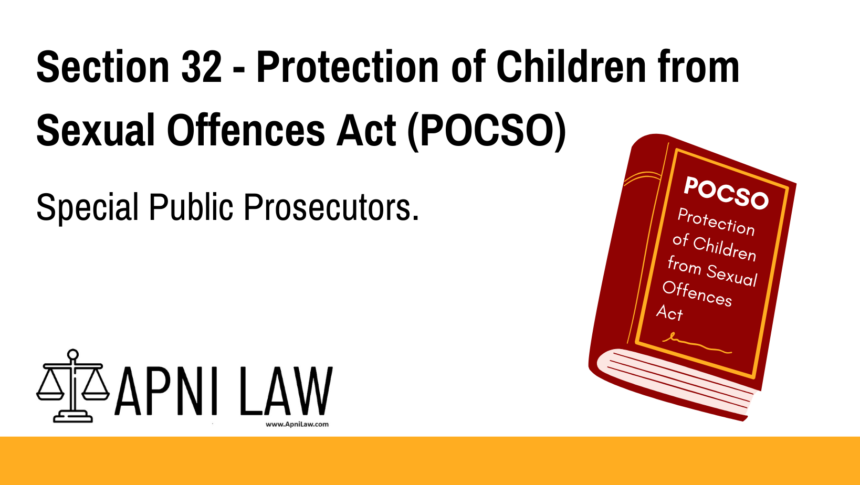Code: Section 32 – Special Public Prosecutors
(1) The State Government shall, by notification in the Official Gazette, appoint a Special Public Prosecutor for every Special Court for conducting cases only under the provisions of this Act.
(2) A person shall be eligible to be appointed as a Special Public Prosecutor under sub-section (1) only if he had been in practice for not less than seven years as an advocate.
(3) Every person appointed as a Special Public Prosecutor under this section shall be deemed to be a Public Prosecutor within the meaning of clause (u) of section 2 of the Code of Criminal Procedure, 1973 (2 of 1974)and provision of that Code shall have effect accordingly.
Explanation of Section 32 POCSO
Section 32 of the POCSO Act mandates the appointment of Special Public Prosecutors (SPPs) by the State Government for each Special Court established under the Act. These prosecutors are designated exclusively to handle POCSO cases, ensuring that sensitive matters involving sexual offences against children are prosecuted by trained and experienced advocates.
Important points include:
- Special Public Prosecutors must be appointed officially by the State Government through a Gazette notification.
- Only advocates with at least seven years of experience are eligible for appointment.
- Once appointed, the SPP is considered a Public Prosecutor as per Section 2(u) of the Code of Criminal Procedure, 1973 (CrPC), meaning all procedural laws applicable to Public Prosecutors also apply to them.
This section helps ensure that only qualified and capable legal professionals are entrusted with the responsibility of handling these serious cases.
Key Provisions
- Appointment by State Government: Made official via notification in the Official Gazette.
- Exclusive Role: The appointed SPP will prosecute only POCSO cases.
- Minimum Experience: Must be an advocate with at least 7 years of practice.
- Deemed Status: Treated as a Public Prosecutor under Section 2(u) of the CrPC.
Illustrations
Illustration 1: Appointment of a Special Public Prosecutor
Advocate Meera, with 12 years of legal experience, is appointed as a Special Public Prosecutor for the Special Court in Delhi. She will handle only cases filed under the POCSO Act before that Court.
Illustration 2: Applicability of CrPC
As an appointed Special Public Prosecutor, Meera is legally considered a Public Prosecutor under the CrPC, and all provisions governing Public Prosecutors in the CrPC will apply to her role.
Common Questions & Answers on Section 32 POCSO
1. Who appoints a Special Public Prosecutor under the POCSO Act?
The State Government appoints the Special Public Prosecutor via notification in the Official Gazette.
2. What qualifications are required to be appointed?
The advocate must have a minimum of seven years’ experience in legal practice.
3. Can a Special Public Prosecutor handle other types of cases?
No. They are appointed specifically for handling cases under the POCSO Act only.
4. Is the Special Public Prosecutor legally treated as a Public Prosecutor?
Yes. Section 32(3) deems them to be a Public Prosecutor under Section 2(u) of the Code of Criminal Procedure, 1973.
5. Why is a Special Public Prosecutor necessary in POCSO cases?
POCSO cases involve sensitive and serious allegations involving children. Special Public Prosecutors ensure that these matters are handled by competent and experienced advocates dedicated exclusively to such prosecutions.
Conclusion
Section 32 of the POCSO Act ensures that sensitive cases involving sexual offences against children are prosecuted by experienced and officially designated Special Public Prosecutors. By aligning their legal status with that of Public Prosecutors under the CrPC, this provision ensures consistency, competence, and seriousness in the prosecution process.
For more detailed legal insights and structured bare act explanations, visit ApniLaw – your trusted legal resource.








